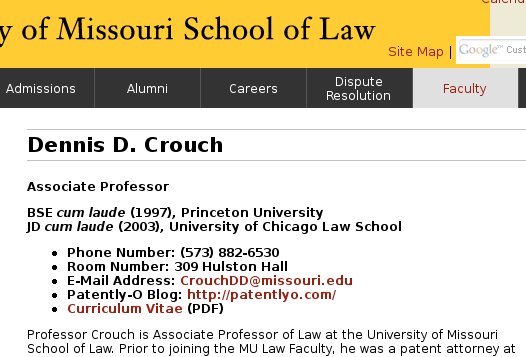11.12.11
Subjective Subject Matter

Summary: Patent lawyers still love and promote software patents while customers and developers are hurting
Dennis Crouch, writing in his pro-patents blog (he is part of this meta-industry and therefore there is bias), harps about “Patentable Subject Matter” and puts forth another great example of how broken the patent system is (not that he would admit that). To quote:
In Ultramercial v. Hulu, the Federal Circuit held that Ultramercial’s asserted Patent No. 7,346,545 fit within the subject matter eligibility guidelines of 35 U.S.C. § 101 and was not merely an unpatentable abstract idea. The patent claims a method of distributing copyrighted products (such as a movie) over the internet. The novel idea is that the copyrighted product be both (1) offered for sale and (2) delivered for free if the consumer agrees to view an advertisement. The district court held the patent invalid under section 101. On appeal, however, the Federal Circuit reversed – holding that the patent claims a “practical application” of the idea that “advertising can serve as a currency.” An important element of the decision was the finding that “[v]iewing the subject matter as a whole, the invention involves an extensive computer interface.”
Watch this other laughable new patent and a “Patent Suit Target[ing] Companies Using Tokens as Micropayments”. This is not innovation, it’s extortion. And those who support this type of system are most typically patent lawyers who are after a quick buck. As one patents critics put it a couple of days ago:
Software Patents Make The iPhone Less Useful
A post by 9-to-5 Mac notes that the iPhone’s text-entry system has a hidden auto-correct feature. As the user types, the phone displays a list of possible completions of the partially-typed word in a row just above the keyboard. The user can tap one of the words to select it. Unfortunately, there’s no officially-supported way to enable this feature, users must hack the low-level configuration files on the phone.
The Register suggests a plausible explanation for this: a company called T9 holds patents covering the concept of auto-correcting text in this manner. So rather than pay royalties to T9—or risk a patent lawsuit—Apple decided to just make the iPhone less useful than it would otherwise be.
This is not making products any better. It doesn’t make innovation reach customers. Who does this system really serve then? And why is the government plugging its ear shut when the citizens complain? We understand the root of this problem and it remains to be decided what to do about it. █
































 Content is available under CC-BY-SA
Content is available under CC-BY-SA
Michael said,
November 12, 2011 at 7:56 pm
I get it. You are against patents. So how do you stop out and out copying of the type we see from Samsung?
http://i.imgur.com/TmUj2.jpg
http://goo.gl/S2AJR
http://goo.gl/bWDs6
http://goo.gl/NjrfV
Until you have an answer for this you are just whining.
Mikko Reply:
November 13th, 2011 at 5:40 pm
lying pictures
missing neonode n1m and lg prada and more
http://www.osnews.com/story/25264/Did_Android_Really_Look_Like_BlackBerry_Before_the_iPhone_
Michael Reply:
November 13th, 2011 at 7:44 pm
Your link says nothing about those images. Its main point seems to be that Google had more than one prototype, which I do not think anyone has denied.